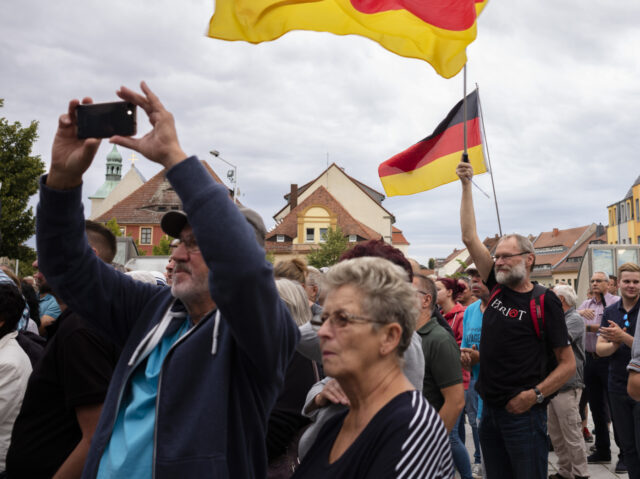Right-wingers and populists have devastated legacy left-wing parties in two state elections in Germany, even if a “software error” in one state was blamed for changing the initial official results, taking two seats away from the right.
The right-populist anti-mass migration Alternative for Germany (AfD) has won a state election for the first time, taking 32.8 per cent of the vote in east Germany’s Thuringia. Counts in the AfD’s favour continued to roll in from the evening, building its lead from earlier declarations. The result gives the party 32 seats in the Free State’s 88-seat parliament, the Landtag, far short of an actual majority.
The party almost managed the same feat twice in one night, with a photo-finish in Saxony, also in east Germany, seeing it come just one seat behind the legacy-centre-right party the Christian Democrats. Both right-wing parties come away with fractionally fewer seats than initially stated by the election authorities, however, with a computer error blamed for their share dropping overnight. Apparently, the computers which calculated the number of seats awarded to each party from the vote share percentage had inadvertently been programmed to the wrong electoral system.
This is particularly consequential to the AfD, as it no longer has a blocking minority in the state, which could have allowed it to block certain votes like the appointment of constitutional judges, the state auditors, and even a vote to dissolve the parliament. In such instances, votes need a two-thirds supermajority to pass, and now the AfD is one seat short.
Also performing well — although little heeded in news reports from outside Germany where a total fixation on the perceived right-wing threat dominates — is a new left-populist political force the BSW, led by former communist Sahra Wagenknecht. The economically hard-left but socially conservative and anti-mass migration party came third place in both states and may potentially become a kingmaker.
In both elections, voter turnout was at historically high levels, and in the case of Saxony, it was the highest state election turnout in modern German history. It was the best state election results yet for the AfD, and absolutely devastating for legacy left-wing and centrist parties, with the Free Democrat liberals and the Social Democrats having their worst election results ever in the race.
In Thuringia, the Green party fell so far that it no longer has any members of Parliament, and the hard-left Linke (left) party tumbled from 29 to 12 seats.
In many cases, responses to the state-level success of the AfD in this election have been dismay in the international press, with the label “far right” routinely applied to the AfD, even as such words lose their power through over-use, and allusions to Nazi-era Germany frequently made. Britain’s The Guardian leads with comments from French liberal politician Valérie Hayer, who reflected on the result: “A dark day for Germany is a dark day for Europe. The election result in Thuringia and Saxony is unprecedented. We shall not let Europe give in to racist, antisemitic, misogynist and homophobic movements.”
For the AfD themselves, the votes in their favour yesterday are all about the German public rejecting tone-deaf, failed establishment parties delivering stagnation. As reported by German broadsheet Die Welt, AfD co-leader Alice Weidel hailed the election as “historic” and said the national government’s authority had been so undermined by constant local election defeats, it was time to call fresh national elections to select new leadership in Berlin.
She said: “Chancellor Olaf Scholz should draw the consequences and pack their bags and vacate their seats with his coalition partners”.
The analysis is somewhat shared by the spokesman for the insurgent left-populist anti-mass migration Sahra Wagenknecht party, who reflected on the results that: “What helps the AfD the most is bad governments”.
As is now typical for many European elections, while a populist-right party may have the largest number of seats, it does not hold close to a majority and few friends to build coalitions with, which may leave these states heading towards yet more rainbow coalition governments to keep the border control right out at all costs. While the AfD and BSW agree on almost everything of consequence, the Wagenknecht leadership has already rejected AfD overtures this morning with contempt, shutting off any road to a potential populist grand coalition.
The centre-right CDU conservatives, formerly led by open borders hardliner Angela Merkel, have also totally ruled out working with the AfD, declaring a “firewall” against their competitors, leading to AfD figures accusing the party of trying to deny the election result by freezing out the largest party in Thuringia.

COMMENTS
Please let us know if you're having issues with commenting.